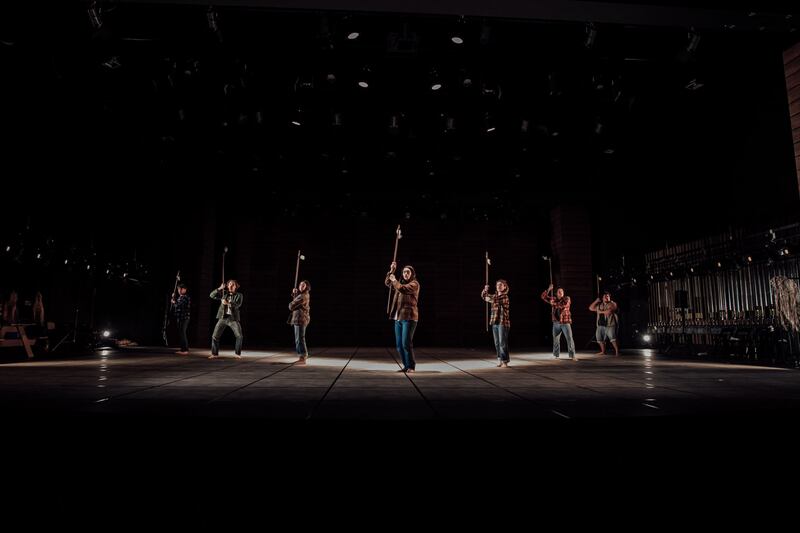A play about a triggering point in Aotearoa history reveals the country's racist past and what it took to change as a nation.
The Haka Party Incident premieres at ASB Waterfront Theatre tonight, and delves into a historic event where young Māori activists clashed with engineering students from Auckland University, who were giving a mock performance of the haka in 1979 during traditional capping escapades.
Director Katie Wolfe of Ngāti Mutunga and Ngāti Tama wrote the play because she says it was a significant moment in history that was misrepresented by the media of the time.
"The media was very biased," she says.
"I could only really take that as an indication. I wasn't really correct about what had gone one."
Ensuring the next generation knows the history, Wolfe has brought her son Nikau Balme on board.
Balme is a passionate kaihaka and a student at Ngā Puna o Waiorea (Western Springs College), and was brought in to write and teach haka for the play.
"Ki te kore ko ia ka kore ahau kia tū ki tēnei o ngā tūranga. Engari ko tērā ahau, kaingākaunui ana ki ngā mahi kapa haka. Kāhore ahau i te mātanga te rangatira o ngā rangatira. Engari ko te pātai atu noa ki a ia, i a ia e rapu ana i tētahi tangata hei mahi i ngā kapa haka ki roto i tēnei mahi whakaari. Ka tū ake ōku ringa, māku māma, māku māma hei pou ārahi i a koe i roto i ēnei o ngā mahi. Ka whakaengia e ia, a, kei konei ahau i tēnei rā."
(If it wasn't for my mum, I wouldn't be here in this position. I love kapa haka. I'm not the expert of all experts. But it was when my mum asked, where could she find someone to teach haka in the play, I put up my hand and said 'me mum, me mum' I can be the one to do it. She agreed and so here I am).

"He maha ngā haka kei roto i tēnei whakaari. He ahua tekau pea. Ko tāku hei whakaako atu ki a rātou i ērā o ngā mahi hei whakanui hei whakamana i te haka anō.
(There are a lot of haka in the play. Around 10. I teach everyone the way we should honour and celebrate haka).
Ko te mana o te haka, he mea whakahirahira rawa, he mea whakahihiko i te ngākau."
(The power of the haka is so powerful, it ignites the soul).
He momo whakaari i te haka. He whakaari i te riri. He whakaari i te tapu i roto i te tangata. Nō reira, he āhua ka tika ki ahau kia tū ai ēnei mahi ki te ahurewa o Hine-Rēhia mā."
(The haka is a performance, an embodiment of rage. It shows the sacredness within a person. So it is only right to me to honour this sacred space of Hine-Rēhia, the goddess of entertainment.)
The history of the Incident
Wolfe says she learned about the haka party incident when she read Ka Whawhai Tonu Mātou, by Dr Ranginui Walker.
She says, 'It seemed to me an extraordinary event that we had a moment of violence between Māori and Pākehā."
Before 1979, it was a rite of passage for University of Auckland engineering students to dress up as Māori, wearing grass skirts, and run riot in the city centre as part of capping events.
The students would perform a mock version of the haka in front of stopped traffic. The mockery continued even though Māori activists had repeatedly asked the engineering students to stop.
So, one night in 1979, a group known as He Tauā broke up the practice. Some violence ensued.
A member of He Tauā rang the media and said they were "protesting at the way the student haka party was turning Māori culture into a racist cartoon to be laughed at."
But on May, 1, 1979. The Auckland Star front page read: "Gang rampage at varsity."
The confrontation resulted in 11 charges of rioting against members of He Tauā.
The play

Wolfe says when she was given the opportunity by the Auckland Theatre Company, she knew that would be the kaupapa for the play. So she embarked on meeting with people who were there on the day of the incident.
"I originally met with Hilda and Hone Harawira here in Auckland and I spoke to them about their memories of the day. And then I went on to try to find some of the engineers."
The play is effectively a documentary on stage, where each actor is required to repeat lines exactly as they were said by those who were involved in 1979.
The Haka Party Incident will appear at ASB Waterfront Theatre until April 10.

